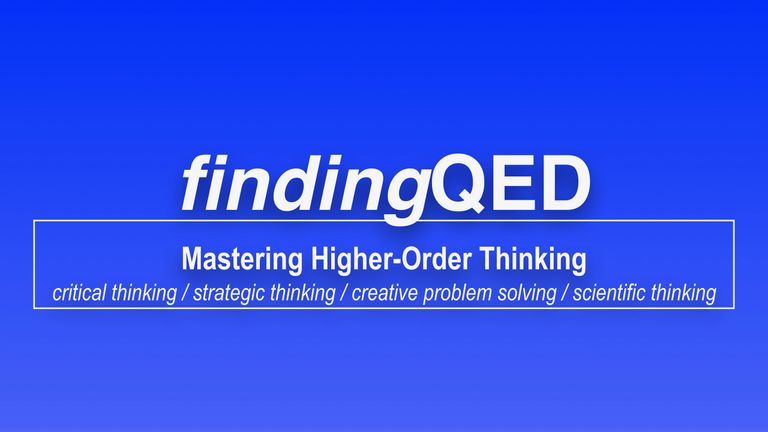
Master Higher-Order Thinking with Interactive Stories
findingQED is an innovative online platform that develops Higher-Order Thinking Skills using engaging, media-rich, interactive, story-based problem scenarios.
Scenarios are efficiently custom created on the platform, incorporating any context and content relevant to the intended users, ensuring that the Higher-Order Thinking Skills are developed, exercised, and assessed within the desired context.
findingQED's approach is based upon widely accepted learning research, refined with distinguished faculty at Stanford University.
What Are Higher-Order Thinking Skills?
Higher-Order Thinking Skills include the ability to:
- Observe with purpose
- Identify context, elements, & issues
- Clarify end-objectives and the plans to get there
- Uncover relevant unknowns and the questions needing resolution
- Analyze, interpret and evaluate information
- Decode, clarify, define, categorize, characterize
- Bring order, organize in a useful way
- Find meaning
- Uncover assumptions & biases
- Judge ambiguities & assess uncertainties
- Connect disparate facts into a greater whole
- Develop and apply conceptual models
- Recognize patterns & establish relationships
- Apply models to create insights
- Derive inferences
- Create solution perspectives
- Support perspectives with well-reasoned fact-based arguments
Will findingQED Scenarios Develop Critical Thinking?
Yes. Critical Thinking is a thinking process that uses these very same higher-order thinking skills. That is, Critical Thinking is comprised of, and relies upon the higher-order thinking skills listed just above. These are the skills that are developed, exercised and assessed with findingQED problem scenarios.
In addition, and similar to the very important process of Critical Thinking, there are other "thought processes" that rely on the same set of higher-order-thinking skills, such as for example:
- Strategic Thinking
- Creative Problem Solving
- Scientific Thinking
It is often said that that "Scientific Thinking" is a form of "Critical Thinking" in a scientific context. Each of these "higher-order thought processes" rely on the same underlying set of higher-order thinking skills, but are simply applied to different particular contexts.
Because findingQED's innovative framework ensures the use of "core" higher-order thinking skills that are applicable across contexts and knowledge domains, the platform enables learners to develop, exercise, and assess their higher-order thinking skills regardless of the scenario's context and domain. Whether the scenario embodies a "strategic thinking" context, a "scientific" context or simply a "common-knowledge" context, the same set of higher-order thinking skills are developed, exercised, and assessed by the findingQED platform.
For more background on how the platform addresses Critical Thinking, Strategic Thinking, and Scientific Thinking, click on "Knowledge vs. Thinking" and "What Scenarios?" from the Deeper Dive menu below.

Who Can Benefit From findingQED Scenarios?
findingQED's powerful framework enables the creation of problem scenarios for any context, topic, and skill level, and that are appropriate for:
- students at any level, from middle school through graduate school;
- professionals wanting to develop and sharpen their capabilities, in any domain;
- Organizations seeking to develop and assess the higher-order thinking skills of their personnel.
Example types of scenarios:
- Determining the most effective strategy for a business after evaluating its economic, political, competitive and technological environments;
- Investigating, discovering and explaining the causes of a physical phenomena;
- Revising a military strategy in response to changing technological, political, economic, foreign alliance, and competitor landscapes;
- Determining the constitutionality of a federal government agency's decision that is contrary to a state's action and interests.
These examples should help to provide a concrete view of the platform's potential usage, but they represent only a tiny fraction of the possible applications of the findingQED platform and scenarios. The contextual milieu, domain knowledge required, and issues to be addressed are entirely prescribed by each scenario's creator.
Custom or Existing Problem Scenarios
The platform also provides easy-to-use scenario creation tools that enables instructors, curriculum designers and third parties to create scenarios in the domain of their particular interest. findingQED is available to co-create custom scenarios as well.
Each scenario can be comprised of any context, topic, and subject matter. The stories and problems arising in scenarios are limited only by one's imagination. The sole requirement is that there be arising in each scenario at least one question, issue, or problem to be resolved, and be at least some information relevant to resolving the problem. There can be any number of best possible resolutions to a scenario problem, and resolutions can have any level of uncertainty.
Resolving each problem, to the greatest extent possible, requires the learner to specify their perspective(s) and support each perspective with a well-reasoned, fact-based argument. Specifying problem resolutions and constructing well-reasoned fact-based supporting arguments are highly active cognitive processes which must be preceded by astute observing, purposeful investigating, insightful analyzing, thoughtful reflection, creative connecting, and coherent synthesizing. These are a few of the higher-order thinking skills that are developed, exercised, and assessed by the platform.
Rich Automated Descriptive Feedback
Each scenario engagement generates automated individualized instructive feedback that supports independent learning and self-development of higher-order thinking skills and processes. In addition, extensive quantitative assessment metrics highlight skills achievement, areas of need, and progress over time, providing powerful data for learners and instructors alike.
From the from the "Deeper Dive" menu just below, explore more about how findingQED develops, exercises, and assesses higher-order thinking skills. Feel free to contact us at info@findingQED.com to learn more about how how we can assist you and the learners in your organization.
Contact us at info@findingQED.com to learn more, for a demonstration, or for an account
Copyright © 2020 findingQED - All Rights Reserved.





